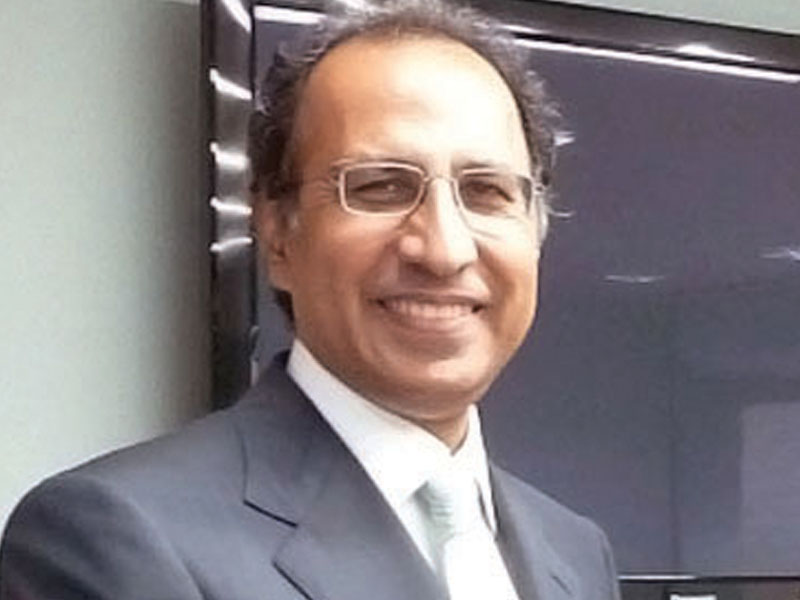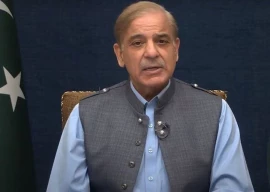
An International Monetary Fund (IMF) mission would visit Pakistan in a few weeks to finalise a deal, announced de-facto finance minister Dr Hafeez Shaikh on Tuesday while also claiming that good news about the economy is coming from all “four corners”.
“The IMF mission will visit Pakistan in a few weeks and will give formal structure to the ongoing discussions,” said Dr Shaikh, adviser to the prime minister on finance, in a joint press conference with Minister for Information Shibli Faraz.
Pakistan had entered a $6 billion IMF programme in July last year but the programme derailed after the government refused to introduce a mini-budget and increase power tariffs.
In February, the government had asked the IMF to delay these measures till June. But due to the adverse impact of Covid-19 on the economy, Prime Minister Imran Khan had decided against taking these drastic steps.
“In the coming days, discussions will take place about how to improve the tax system, increase the tax collection and bring improvements in the electricity system,” Dr Shaikh added.
However, the IMF Resident Representative to Islamabad Teresa Dabán Sanchez told The Express Tribune that the IMF missions to all member countries, including Pakistan, are currently suspended due to Covid-19 situation.
“The IMF missions, as visiting missions of IMF staffers, are at present suspended, because of Covid, not only to Pakistan, also to other countries. All work is being done virtually,” she said.
Teresa said at this conjuncture she could only reiterate that the IMF team and the Pakistani authorities remain closely engaged with a view to bring the second review of the EFF to a positive conclusion.
Last week, the Ministry of Finance spokesman Kamran Afzal had said “Amendments to the National Electric Power Regulatory Authority (Nepra) Act and the State Bank of Pakistan (SBP) Act are expected to become prior actions for the approval of the second review of the Fund programme.”
According to the original schedule of the IMF loan programme, by now Pakistan and the IMF should have begun preparations for the fourth review and the fifth loan tranche.
So far, the IMF has disbursed roughly $1.5 billion in two tranches and the completion of the second review remains pending due to delay in introduction of mini budget and increase in electricity tariffs.
Shaikh said on Tuesday increasing tax collection is in the benefit of Pakistan.
“The IMF has good relations with Pakistan and the government is implementing the three main conditions of the Fund about increase in the tax collection, reducing the government expenditures and making timely debt repayments,” said Dr Shaikh.
He once again declared economic victory while citing improvement in many indicators. “Good news about the economy is coming from all the four corners. Economy is picking up and large scale manufacturing, automobile, fertilizer and motorcycles productions have increased.”
To a question whether the government is prematurely declaring victory, Dr Shaikh argued that despite adverse impact of the coronavirus on the economy, things are improving, which the government wants to tell to the people.
“There is commendable reduction in expenditures and the external account has stabilized,” he said.
However, the fiscal operations summary that the Finance Ministry released last month disclosed that the government expenditures increased in double digits and the gross revenues posted negative growth in the first quarter of this fiscal year.
“No supplementary grant was issued during the first four months of the fiscal year and the defense expenditures were frozen,” Dr Shaikh said.
But the Economic Coordination Committee (ECC) has regularly been approving technical supplementary grants, including additional Rs38 billion given to the armed forces a day earlier. Last month, the ECC also diverted Rs1 billion from subsidies and miscellaneous expenditure head to pay off Hajj expenses.
“No increase in public debt”
During the July-October period of this fiscal year, the primary budget balance was in surplus and there was no need to acquire more debt. From June 30 to October 30, there was no increase in public debt, which remained unchanged at Rs36.4 trillion, which is a huge success,” he said.
The public debt, the adviser said, did not increase because of increase in tax collection and revaluation of the external public debt after appreciation of rupee.
Dr Shaikh did not disclose the overall budget balance number during July-October period, whether it was in surplus or deficit. In case of a deficit, the government must have taken more loans. During the first quarter, the overall budget deficit was equal to Rs502 billion, according to the Finance Ministry.
The primary balance is the sum of total revenues excluding interest payments, which does not mean that the government's revenues have exceeded its expenditures.
The debt bulletin released by the central bank last week showed that the gross public debt, which was the direct responsibility of the government, increased to nearly Rs37 trillion as of the end of September.
The central bank data showed that there was Rs551 billion increase in public debt from July through September of this fiscal year. The gross public debt was now equal to 81.1% of GDP, far higher than the 60% statutory limit set in the Fiscal Responsibility and Debt Limitation Act of 2005.
‘External account under control'
“The government has completely controlled the current account deficit, which over two years ago was $20 billion and has now turned into a surplus of $792 million,” said the adviser. The rupee, he said, has strengthened against the dollar and the foreign exchange reserves are touching $13 billion.
“Everything is under control and after revaluation of currency the prices of wheat and sugar will further come down,” said Shibli Faraz. Dr Shaikh said the government measures were aimed at providing relief to people and creating jobs. “Jobs are created,” he added.
He said there is a 36% increase in profit margins of top 100 companies. However, Dr Shaikh did not tell that their profits increased largely because of reduction in interest rates.
The adviser also claimed that there was no exporter in Pakistan who did not receive refunds within 72 hours after submitting form-H to the Federal Board of Revenue (FBR).










1726732405-0/Express-Tribune-Web-(15)1726732405-0-270x192.webp)







COMMENTS
Comments are moderated and generally will be posted if they are on-topic and not abusive.
For more information, please see our Comments FAQ